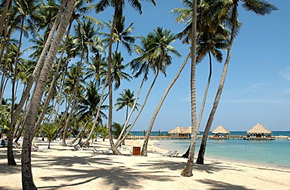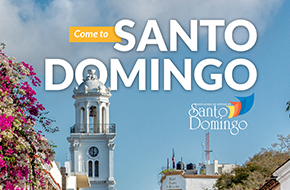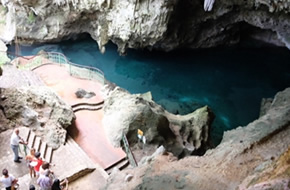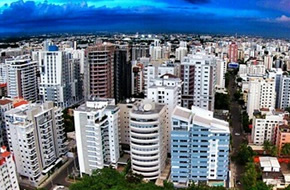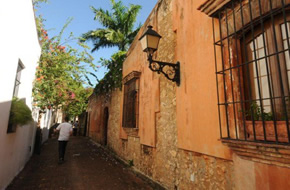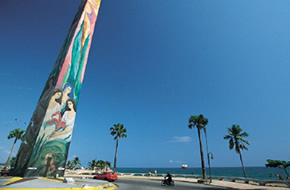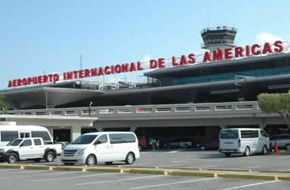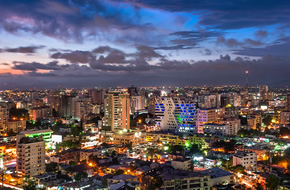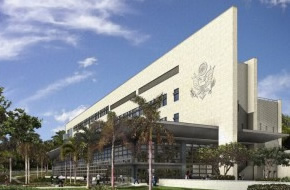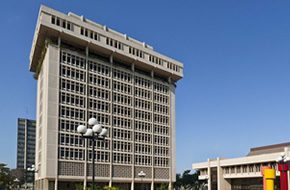Doing Business in SD

BUSINESS CLIMATE IN THE DOMINICAN REPUBLIC.
The Dominican Republic is in a strategic geographical area for the global exchange of goods and services. Economic stability and social peace that characterize the Dominican nation, represent an excellent environment for local and foreign entrepreneurs to invest in various productive sectors of the economy.
The protection and promotion of business activities that prevails in the country, located as the first foundation of free enterprise, a fundamental right enshrined in the Dominican Constitution. Indeed, the Dominican State recognizes and guarantees of free enterprise, trade and industry, provided by constitutional mandate, that business, public or private, receive the same treatment in law, ensuring equal conditions for domestic and foreign investment (Articles 50 and 221 of the Constitution).
The tourism sector, the backbone of our economy as an important source of income and job creation, is a tangible example of investor confidence in the legal framework to protect investments and business in the Dominican Republic. Recognized chains and hotel groups conducting operations for several decades in the country, attracted by the large flow of tourists who annually experience a statistical growth.
Thus, regulation of sensitive sectors for the national economy, directly affecting the business climate and sustainability of the Dominican Republic. Here are some interesting aspects for starting and managing business operations in the country:
1. Corporate and business vehicles.
Persons wishing to invest in the country, have a catalog of different options for structuring their business operationally. The General Law of Commercial Companies and Individual Enterprises Private Limited number 479-08, enacted as of December 11, 2008, as amended by Act No. 31-11, recognizes as corporate structures and business ways of doing business, to :
- Companies in collective name;
- The limited partnerships;
- Companies limited by shares;
- Limited liability companies;
- Corporations;
- Corporations simplified (SAS);
- The accidental or venture companies, and
- Individual Company Private Limited (EIRL).
It is noteworthy that commercial companies established abroad, are also recognized automatically in the Dominican Republic, after verification of its legal existence by the appropriate authority.
Each of the types of companies and enterprises described above, have their own peculiarities. The choice of appropriate corporate vehicle will depend closely on the interests of investors, purpose and size of investment, the purpose and the commercial business to be exploited.
2. Financial Markets.
The Dominican Republic has a strong financial market, with regulators in the areas of banking, insurance, securities and pensions. The case of the regulatory regime of monetary and financial system of the Dominican Republic, is enshrined in the Monetary and Financial Law 183-02 number of twenty-six (26) of November two thousand and two (2002) and its implementing regulations. This legal framework seeks to ensure compliance with the liquidity, solvency and management at all times be met by financial intermediaries under the supervision of the Monetary Authority and Financial.
For its part, by the Securities Market Act, the eight (8) The month of May, two thousand (2000) and its implementing regulations, the legislature has been to promote and regulate the securities market, seeking a market organized, efficient and transparent, contributing to the economic and social development. The Dominican stock market, including supply and demand for equity securities, credit, debt and products. Similarly, derivatives includes, whether on securities or products. The scope of this Act and the Regulations, covering the public offering of securities, both domestic and foreign currency-issuers, commodity exchanges, participants in the stock market, and any natural or legal, national or foreign, to participate in the stock market in the Dominican Republic.
In the insurance area, the country has Law No. 146-02, dated twenty-six (26) September, two thousand two (2002) Insurance and Bonding in the Dominican Republic. The legislation, introduced technical concepts in order to provide maximum protection to policyholders and to create safeguards that are necessary in the insurance business to which the parties are satisfied that contracts receive a faithful compliance. This Act, conferred legal personality and its own assets to the Superintendent of Insurance, the industry regulator.
Meanwhile, the head of the pension sector is the Superintendent of Pensions, established under Law No. 87-01 as a state entity, autonomous legal personality and its own, with the duty to ensure the strict law enforcement and complementary rules in their area of ??responsibility to protect the interests of members, monitoring the financial solvency of the Pension Fund Administrators (AFP) and help strengthen the pension system Dominican.
3. Labour and Social Security System.
Another aspect of interest to national and foreign investor, what is the legal framework regulating relations between employers and workers in the country. This legal framework is composed mainly of Labor Code of the Dominican Republic adopted by Law No. 16-92 dated seventeen (17) of June 1992 (1992), the different conventions adopted by the International Labour Organization (ILO) and the resolutions issued by the Ministry of Labour. These policy instruments, protect and safeguard the rights of all persons, whether Dominican or foreign, who are at work in the Dominican Republic.Thus, its provisions are territorial in nature and apply without distinction to Dominicans and foreigners, except derogations allowed in international conventions.
The Labour Code prohibits discrimination, exclusion or preference based on sex, age, race, color, national extraction, social origin, political opinion, trade union activity or religious belief. Similarly, fringe benefits granted to workers, such as the payment of wages thirteenth and vacation pay. It further emphasizes the primacy of contract-reality, that is, that the employment contract is one that runs on the facts.
Meanwhile, the current social security system, introduced by Law No. 87-01, provides compulsory universal coverage under non-discrimination, to all Dominican citizens and foreigners residing in the country, against risks of old age, disability, unemployment for elderly, survivors, sickness, maternity, childhood and occupational hazard.
4. Real Estate and Intellectual Property Rights.
The Dominican Constitution recognizes the right of property as a fundamental right (Article 51). Under this premise, our country has the Law on Land Registry number 108-05, which is to regulate sanitation and registration of all interests in land, as well as liens and encumbrances may be registered in relation to propertycomprising the territory of the Dominican Republic, and ensure the legality of their mutation or involvement with state intervention through the competent organs of the Property Jurisdiction. Hence, all registered right under the said law, is imprescriptible and enjoys the protection and absolute guarantee of the state.
In another vein, the Dominican Constitution recognizes and protects the right of exclusive ownership of the scientific, literary, artistic, inventions and innovations, trade names, trademarks, service marks and other productions of the human intellect by time, in the form and with the limitations established by law (Article 52).Thus, the constitutional protection of literary works, patents, industrial designs, utility models and logos of products and services devoted to intellectual property as a fundamental right, and complements the legal protection of the law Copyright and Industrial Property Laws established by the numbers 65-00 and 20-00, and their amendments.
5. Taxation.
By Law No. 11-92, adopted the current Tax Code of the Dominican Republic. This piece, as amended on numerous occasions, and different special tax laws constitute the legal framework for the generation, collection and payment of domestic taxes in the country, being at the head of the tax system the Directorate General of Internal Taxes (DGII) agency for the collection of domestic taxes.
The tax system of the Dominican Republic based on the principle of territoriality. Hence, in principle, all income from Dominican sources are subject to local taxes, regardless of the nationality of the person who generated. The main taxes in the Dominican Republic are the following:
Income Tax: This tax is levied on all income, income, profit or benefit received by individuals, societies and undivided, in a given fiscal period. The legislation provides that any natural or legal person residing in the Dominican Republic and undivided estates of deceased residing in the country are subject to tax on their income from Dominican sources and from sources outside of the Dominican Republic from investment and financial gains. Natural persons resident or domiciled in the country, will pay on taxable income of the fiscal year, a step rate of 15%, 20% and 25%, as applicable. Meanwhile, legal persons shall pay a rate of 29% on net taxable income of the fiscal year.
Tax on the Transfer of Industrialized Goods and Services (ITBIS): The ITBIS is a value added tax, which taxes the transfer and importation of industrial goods and the provision and location of services. Both individuals and legal persons are obligated to pay this tax, provided they carry out transfers and imports of manufactured goods, or services. This tax rate is 16% and is calculated on the taxable transfer price or the service provided.
Real Property Tax (IPI) IPI is a tax on houses and lots located in urban areas where construction has risen, the value, including solar, exceeds RD $ 5,000,000.00, adjusted annually for inflation. The reimbursement rate is 1% applied on the excess value of the dwelling, or 1% applied on the excess value of the land.
Tax on Assets. The tax on assets applied to all assets listed on the balance sheet of the taxpayer, not adjusted for inflation, after deductions for depreciation, amortization, reserves for doubtful accounts, investments in shares of other companies, the land located in rural areas, the buildings by nature of farms and taxes advanced or advances. The tax rate is 1% per annum, calculated on the total amount of taxable assets.
Other Taxes: In addition to the above, the contributor of the Dominican Republic is bound, as the incurrence of the tax liability to pay: Excise Tax, Inheritance and Gift Tax, Motor Vehicle Tax, Tax on Casinos; Tax Conditional Sale of Furniture, among others.
Along with the taxes described above, in order to encourage investment in certain productive sectors, the legislature voted tax incentive laws, which constitute legal frameworks aimed at reorganizing the implementation of fiscal policy, against a production system determined. These laws have constitutional recognition, in establishing our Constitution that the law may grant special treatment to investments that are located in areas of less developed or in activities of national interest, particularly those located in the border provinces (Article 221 of the Constitution).
The Constitution also regulates the granting of waivers, exemptions, reductions or limitations of taxes, or fiscal or municipal affecting certain works or undertakings at which attract appropriate investment of new capital for the development of the national economy or for other items of social interest, such as for example the tourism sector.
In the Dominican Republic, laws are the following incentives:
- Law No. 84-99 on revival and promotion of exports;
- Law No. 28-01 creating a Border Development Special Zone, which covers the provinces of Pedernales, Independencia, Elías Piña, Dajabón, Montecristi, Santiago Rodriguez and Bahoruco, as amended by Law No. 236-05;
- Law No. 158-01 Tourism Incentive, amended by Law No. 184-02;
- Law No. 56-07 which declares a national priority sectors within the textile chain;
- Law No. 57-07 of Renewable Energy Incentives and Special Regimes;
- Law No. 171-07 on Special Incentives for Pensioners and Annuitants foreign source;
- Law No. 392-07 on Industrial Competitiveness and Innovation;
- Law No. 108-10 for the Promotion of Film Activity, amended by Law No. 257-10.
6. Foreign Investment.
Law No. 16-95 of twenty (20) November 1995 (1995) and its implementing regulation contained in Presidential Decree No. 380-96, later amended by Presidential Decree No. 163-97, contain the main regulatory framework for foreign investment in the country. The legislation aims to strengthen the foundations which have to sustain the process of attracting wealth from other countries, that is, seeks to lay the groundwork for the development of strong foreign investment in the country.
The main incentives provided in Law No. 16-95 are:
- National treatment for foreign investors;
- Restrictions minimum investment;
- 100% repatriation of profits;
- Free convertibility of funds;
- Free access to international currency through local banks and the Central Bank of the Dominican Republic;
- Registration procedures fast and simple.
As a major player in this scenario, stands the Center for Exports and Investment of the Dominican Republic (CEI-RD), decentralized government institution dedicated to the export promotion activities and the promotion of foreign direct investment.
Notably, in the area of ??investment protection, the Dominican Republic is above 118 other world economies, according to new report by the World Bank and International Finance Corporation (IFC) entitled "Doing Business 2012: Doing business in a more transparent ", which shows that the Dominican Republic continues to adopt reforms to protect investors, legal security and defense of transparency. Also in the 2012 Index of Economic Freedom published by the Heritage Foundation and The Wall Street Journal, by which we analyze the business climate and public policies that prove to be attractive for investments in a country or nation is the Dominican Republic above 94 world economies with a score of 60.2 points, score above the world average (59.5).
7. Free Zones.
The Dominican Republic has the structure required for the development of free zones for export of products and services that create efficient operations within the current competitive market. In addition, the Dominican Republic has elements essential for good performance and increased profitability, such as skilled labor and port and airport infrastructure.
Law No. 8-90 on the Free Zones in the Dominican Republic and its implementing regulation, establish the regulatory aspects for operations, recognizing the benefits acquired by entities belonging to that regime such as taxation, under the coordination andsupervision of the National Council of Free Zones. This policy encourages the establishment of new zones and the growth of existing regulating its operation and development, and providing incentives in the special scheme for customs control, and tax exemptions of up to 100% on certain items set out in legislation .
8. E-commerce.
In order to regulate electronic commerce in goods and services was enacted Law No. 126-02 on Electronic Commerce, Digital Documents and Signatures, dated four (4) The month of September, two thousand two (2002), which allows the execution of contracts for goods or services to be operated validly electronically.In this sense, legal rules provide that as between the originator and the addressee of a data message, or between parties to a digital document, if any, do not be denied legal effect, validity or enforceability of a expression of will or other statement on the sole grounds that it is in the form of digital document or data message.
9. Trade and Global:
As an open economy, the Dominican Republic has adopted a policy of active integration into world trade, signing agreements and treaties that move the global competition to the local level. Within the agreements of great importance to international trade signed by our country in recent years, highlights the signing of the Free Trade Agreement between the Dominican Republic, Central America and the United States of America ("DR-CAFTA" for short in English), which establishes the rules governing trade relations between the contracting countries, through a zone for the exchange of goods and services.
Since its entry into force, the DR-CAFTA amended the regulation of relations between a distribution and a Dominican American side, which until then was governed by Act No. 173 on Protection Agents Importers of Goods and Products, May 1996 (1966), legal text that is responsible for providing protection to people who are dedicated to promote and sell items and goods manufactured by foreign companies. So, today these relations are governed by the provisions referred to in Section B of Chapter 11 on Trade in Services of the said treaty. Similarly, we highlight the signing of Economic Partnership Agreement and the commitments on development cooperation, trade, social and institutional arrangements signed between the CARIFORUM States on the one hand, and the European Community and its members other. This agreement has a huge potential for our country in promoting trade for the services sector, including tourism.
Moreover, we find the efforts of the Directorate General of Customs (DGA), who recently announced on 9 February 2012, the start of work for implementation of the Single Window of Foreign Trade of the Dominican Republic (VUCE) system that will streamline the buying and sale and international transport and through which all customs formalities are carried out by a single pathway.




